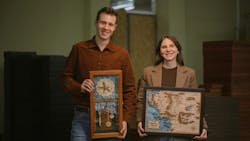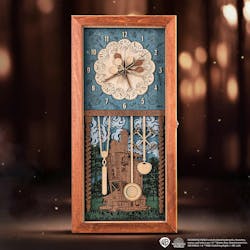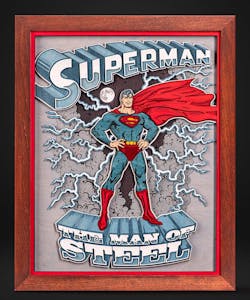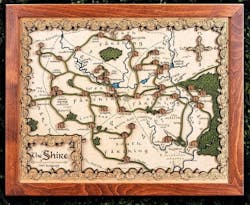For a manufacturer operating in Ukraine near the Polish border, stopping production two or three times a week is a given—not just for quality issues, or troubleshooting a bottleneck, but for your people to get to safety during air-raid alarms. You build in time for power outages, planned or unplanned. Some of your best people may have to leave abruptly when they are called to serve on the front, so you constantly try to recruit other skilled workers who are looking to relocate because your city is farther from the fighting.
That’s the reality for ZeWood, a small manufacturer in the river city of Lutsk, that manufactures playful, multidimensional wooden clocks and wall maps of fantasy worlds inspired by books, video games and films.
In three years, husband and wife Andrii and Anna Panko have grown the business from a kitchen-table operation in Andrii’s parents’ house to a $1.6 million business with more than 20 employees. In ZeWood’s manufacturing facility, machinists and engravers work alongside calligraphers and fine-art painters to build creations based on the universes of Harry Potter, Lord of the Rings, World of Warcraft, Fantastic Beasts and Game of Thrones. ZeWood’s thus-far bestseller, a Harry Potter Weasly family clock, springs to life with cartoonish carvings of clouds and clockworks. Clock owners can affix their own family pictures to the spoon-shaped clock hands, making them honorary Weaslys.
Success has required nimbleness and creativity in problem-solving and patience in spades.
Build on Your Strengths
While the couple has a shared love of fantasy-fiction, Andrii brought to the mix skills previously running a small e-commerce company and a wood import-export firm, and an appreciation for woodworking. (His grandfather made his living as a woodcarver.) Anna brought serious fine-art, photography and design skills, which helped elevate their products with fanciful engravings and backgrounds, 3D topographical elements and hand-painting to bring out the texture of the wood and give fairytale flourish. Anna’s skills have been essential in marketing as well, for creating compelling content of the products—video and photographs for social media, Etsy and Amazon.
“Andrii has had a passion for wood since his childhood,” said Anna. “And he did his research to see what was already out there. There were many Ukrainian companies creating wooden décor items. That’s when we started to create our wooden map. But after that, we understood that the market is full of wooden wall maps, and we started to search for something unique, something special.”
Each map layer can take up to an hour to machine, with all the details. “You also have to be really careful with the painting, gluing and packaging and just know how to work with wood, because it’s important for us to keep the wooden structure visible,” said Anna. “We don’t want it to look like plastic. We want people to know that it’s a natural material and it’s always different dependent on how nature created it.” Each layer of the map is hand-painted, and tiny embellishments are added with crayon.
“We are paying attention to the small details, and our customers appreciate it,” said Anna.
Look Local
ZeWood’s plywood suppliers initially came from Asia, but after the war started, “we started to look for local suppliers, and we tried some companies from Lviv and also from other parts of Ukraine,” said Anna. Eventually, they found a manufacturer in Lutsk that could make plywood to their specifications. “Now we are their biggest customer.”
Before the clocks and maps can go to market, the designs require licensing approval. The Weasly clocks, for instance, went through iterations with both Warner Bros., which owns the film rights, and J.K. Rowling’s team, which owns the character rights.
“The whole process is exhausting,” said Anna. “They come back with some comments or approvals, but actually more often they are comments, and then we have to recreate it. Sometimes we have to recreate the whole design.” It can take months and several iterations to get to pre-production. “And then we send production samples, either a photo or the physical item.”
Think Outside Ordinary Channels
ZeWood’s first marketplace was Etsy. Instagram and Facebook ads generated good returns. “When we invested like $100 in ads, we’d have $300 or $500 in sales,” said Anna. “It helped to get some profit, to have enough money to create and send the items. When we started to sell more items, we increased the budget.”
Shipping has been another hurdle. Because of transportation limits in Ukraine, products are shipped by truck to Poland, where they go through customs and are sent by plane around the world. Right now, shipping can take seven business days, which isn’t ideal. “Lots of people buy our products as a gift, and it’s important to have them delivered within one to three days, depending on the country.”
To reduce waits, the Pankos are working to expand their Amazon shop and ship products through the global Amazon warehouse system, with faster fulfillment times. In January, Anna attended SpielWarenmesse, the annual toy industry convention in Nuremberg, Germany, “to have some meetings with different companies and discuss some possibilities of working together. And maybe next year we’ll have our own stand there.”
The war “is unfortunately the reality we live in. Sometimes it’s just the alarm, and sometimes it’s worse. We try to keep the work climate good, but all the people are tired. Because you can’t be 100% sure tomorrow you will be safe. But we always try to make our people feel important, because they are important to us.”
Main photo: Andrii and Anna Panko of Zewood.
About the Author

Laura Putre
Senior Editor, IndustryWeek
As senior editor, Laura Putre works with IndustryWeek's editorial contributors and reports on leadership and the automotive industry as they relate to manufacturing. She joined IndustryWeek in 2015 as a staff writer covering workforce issues.
Prior to IndustryWeek, Laura reported on the healthcare industry and covered local news. She was the editor of the Chicago Journal and a staff writer for Cleveland Scene. Her national bylines include The Guardian, Slate, Pacific-Standard and The Root.
Laura was a National Press Foundation fellow in 2022.
Got a story idea? Reach out to Laura at [email protected]





